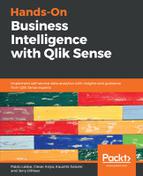ODAG is not enabled on Qlik Sense Enterprise by default. Instead, you have to enable it in the QMC.
To enable it, follow these steps:
- Log into your Qlik Sense with administrator rights and go to QMC:

- Find the option to enable On-demand apps service under MANAGE RESOURCES:

When you select that option, you're going to see this screen:

The most important option here is the first one, where you enable the service that handles on-demand requests. The other options are as follows:
- Logging level (Off-through Trace): This is where we set how verbose our log messages will be.
- Number of apps that can be generated at one time: This option is important if we have a large user base, so you can configure how many apps (and requests) are generated at once. The default number is 1 and the maximum is 10. This affects the response time and user experience. If our database queries are slow, we could incur poor performance if we set too many applications.
- Number of days before purging historical data: This parameter sets the number of days an application is preserved before it is removed. Set this parameter to 0 so it never deletes anything (90 default, 365 maximum).
- Allow anonymous users to generate apps: If our Qlik Sense license permits an anonymous user, enable this option to permit them to generate applications.
- The proxy user used for generating apps on behalf of anonymous users: The parameter will set the username that will serve as the proxy user for anonymous users if the previous parameter is enabled. Choose a regular user with permission to create on-demand applications.
- Number of minutes to keep apps generated by anonymous users: Set how many minutes an app generated by an anonymous user will be kept. If set to 0, this will persist for 365 days. The limit is measured from the last data load.
